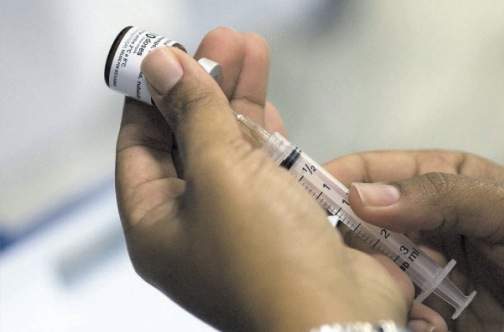LOCAL health officials are on alert for cases of measles in light of outbreaks in the Americas and parts of Europe.
While there are no reported cases locally, Health Minister Dr Christopher Tufton told the Observer that the situation is being closely monitored and, in the event that measles is imported, the country is prepared to control the disease.
The health minister said there is therefore no need for alarm or worry.
In response to questions from the Observer, the Ministry of Health said Jamaica is making every effort to maintain unvarying coverage of 95 per cent of the population with the first and second doses of the measles, mumps, rubella (MMR) vaccine in all parishes.
In addition, the health ministry said it is maintaining a reserve of the MMR vaccine and syringes for control of imported cases; and strengthening epidemiological surveillance of measles to achieve timely detection of all suspected cases by reminding health care providers in public and private facilities to report fever and rash cases immediately, and ensure that samples are properly collected and forwarded to the laboratory.
According to the Pan American Health Organisation (PAHO), in the Americas, coverage rates for the first dose of MMR vaccine are currently less than 95 per cent. It said vaccination coverage rates for children five years and under must be 95 per cent or greater, among all populations, in order to maintain elimination.
PAHO pointed out that in 2016, the Americas became the first in the world to obtain the measles elimination certification, following years of concerted efforts to vaccinate children, but explained that the the fact that a disease has been eliminated does not mean that it no longer exists; rather, it does not circulate in a specific area.
According to PAHO, a country is no longer considered to be measles-free when the same type of virus has been circulating for more than 12 continuous months.
In 2017 there were 149,142 cases of measles reported globally, with the Americas accounting for just 0.6 per cent of all cases. PAHO also reported that in July 2017, Venezuela reported the first case of the current measles outbreak, and confirmed that this outbreak was due to a virus strain that was originally reported in Asia and later in Europe.
In 2018, as of August 20, PAHO said Venezuela has reported 3,545 confirmed cases of measles, including 62 deaths. Ten other countries in the region have reported a total of 1,459 confirmed cases and six deaths.
Measles can also cause blindness, meningitis, brain swelling, and deafness.
Locally, the required 95 per cent coverage for the MMR1 and MMR2 vaccine was met for 2017. The health ministry told the Observer that for the first seven months of 2018, the target was met for MMR2, however, the target for MMR 1 was not met.
In order to improve coverage and protection, the ministry said the timing of the second dose of MMR was changed to coincide with the DPT (diphtheria, pertussis [whooping cough) and tetanus] vaccine at 18 months. The ministry said “marked improvements have been noted”.
Additionally, for adults and older children who were not vaccinated, they are offered the first dose on first contact with the health care provider and the second dose four weeks later. There is also a ‘catch up’ or ‘accelerated’ vaccination for children over six years who have never been vaccinated.
The ministry also said that, in accordance with PAHO/World Health Organization recommendations, all travellers aged six months and older who cannot show proof of vaccination or immunity must receive the MMR vaccine at least two weeks before travelling to areas where measles transmission has been documented.
Amid a growing “anti-vaccination” movement locally, the health ministry has said that those against vaccines should realise that immunisation prevents two to three million deaths per year.
The ministry said, too, that vaccination protects children from serious illness and complications of vaccine-preventable diseases, which can include amputation of an arm or leg, paralysis of limbs, hearing loss, convulsions, brain damage, and death.
“With vaccines, death from measles has fallen by 84 per cent between 2000 and 2016 and 2016 was the first year that measles deaths were below 100,000,” the ministry said.
Meanwhile, Dr Ludrick Morris, head of the paediatric department at Savanna-La-Mar Hospital, said he knows there are individuals sceptical about vaccines, the research they hold fast to has been rubbished multiple times.
“An article was published about the link of autism and the MMR vaccine. It looked at 12 children and it was eventually dubbed erroneous research. It has been disproved in multiple follow-up research on the issue. With the outbreak of measles in Europe and the deaths caused by measles, the individual who did that research and published erroneous information is now on manslaughter trial. That’s just to show you the seriousness,” Dr Morris said.
He added: “If individuals think there is an adverse outcome from vaccines, bring it to the attention of your physician. But we have to ensure we safeguard the population [for] an outbreak of measles, apart from severe mortality, the morbidity is great. We are talking about the pneumonia, encephalitis (swelling of the brain), and you can end up with severe disability. In fact, for some people who contract measles, about eight to 10 years after there is a disintegration of the brain and it is fatal, as there is no treatment. It is unfortunate if that should happen in this day and age.”











